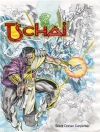Reminiscent of Bruno Schulz’s
Street of Crocodiles, Oleg Woolf’s
Bessarabian Stamps — a cycle of 16 stories set mostly in the village of Sanduleni — is a vivid, surreal evocation of a liminal world. Sanduleni’s denizens are in permanent flux, forever shifting languages, cultures, and states (in every sense of the word). Woolf has relocated magical realism to Moldova. With the turmoil in current Russia and the post-Soviet world,
Bessarabian Stamps emphasizes the absurdity of the mundane.
Mengenai Pengarang
Oleg Woolf was born in 1954 in Moldova, and passed away in 2011 in the United States. A physicist by training, he spent a number of years on geophysical expeditions throughout the former Soviet Union. Along with his wife, Irina Mashinski, he was the founder and editor of the bilingual press Stosvet and its journal
Cardinal Points.
Boris Dralyuk holds a Ph.D. in Slavic languages and literatures from UCLA, where he lectures on Russian literature. His work has appeared in various literary and academic journals. He is the translator of Leo Tolstoy’s
How Much Land Does a Man Need? (Calypso Editions, 2010), the cotranslator of Polina Barskova’s
The Zoo in Winter: Selected Poems (Melville House, 2011), and the recipient of the 2011 Compass Translation Award. His study of Russian popular detective stories,
Western Crime Fiction Goes East: The Russian Pinkerton Craze, 1907-1934, is available from Brill. He lives in Los Angeles.












